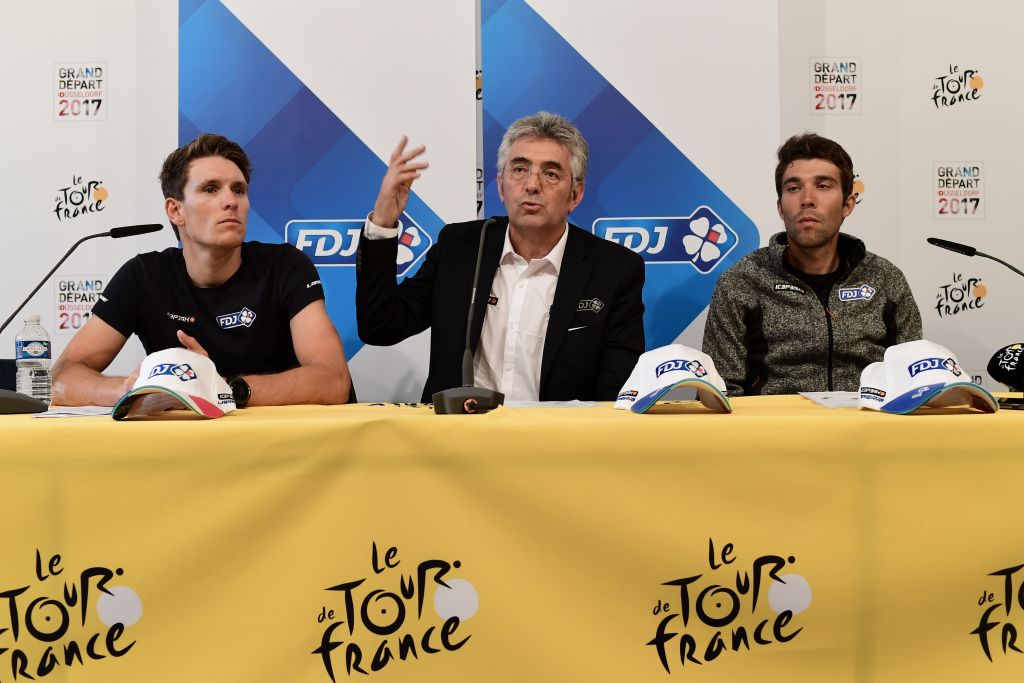Madiot: We're turning riders into robots
Groupama-FDJ manager says data and communication technology is placing riders under extreme pressure

Marc Madiot has expressed concern with the prevalence of data and communication in modern cycling, arguing that riders are being turned into ‘robots’.
In an interview with L’Equipe, the long-standing Groupama-FDJ manager cited earpieces, bike computers, and – away from racing – social media as factors contributing to a growing mental strain on riders.
"There is permanent surveillance in the peloton, and it also exists in training," Madiot said. "Earpieces… I’m sorry, but we have a briefing before the race – we don’t need to intervene every three seconds. It’s a supplementary and permanent pressure on the rider.
"Nowadays, in the team cars, you can no longer risk losing, and that increases the pressure. You end up telling the riders to take the roundabout on the left, or the right, and you’ll gain four places. So you can understand how that could come to weigh on the mind of a rider."
As well as receiving information in their ears, the vast majority of riders also have computer screens on their handlebars, giving them live data for their power output and heart rate.
"They’ve got their noses buried in their screens. We’ve even seen riders crash because they weren’t looking at what was in front of them," Madiot said. "There’s no spontaneity anymore in the sporting act. You still have it a bit in football, for example, but we no longer have it."
Madiot also referred to the live tracking of riders from team cars, citing the incident involving Remco Evenepoel at last year’s Il Lombardia. The use of such GPS and data-relaying technology is banned by the UCI, which launched an investigation that was later closed with no action taken against Evenepoel or his Deceuninck-QuickStep team.
Get The Leadout Newsletter
The latest race content, interviews, features, reviews and expert buying guides, direct to your inbox!
"When Evenepoel crashed at Il Lombardia and a director said ‘he disappeared from our screen’, well, he should never have appeared on any screen," Madiot said.
Deceuninck-QuickStep have not addressed those comments from the director in question, Davide Bramati – which UCI president Davide Lappartient has also referenced – but insisted the item the Italian removed from the rider’s pocket was a ‘finish bottle’, and not a data device.
"Take data from riders, sure, but keep it hidden – and not live," Madiot said.
"I’m sorry to say it, but we’re in the process of turning riders into robots. They recite a lesson that they’ve learned by heart, and we correct them constantly, in real time."
Even away from races, Madiot, who won Paris-Roubaix in 1985 and 1991, worried about the impact of technology on riders.
"If you suggest that they switch off, they don’t want to, because they’re afraid of the emptiness," he said.
"The riders are at home and they find nothing else to do other than put what they’ve done on Strava, or showcase their life on Twitter or Instagram. Maybe I’m an old fool, but in my day, I didn’t tell anyone what I’d done in training – to surprise them in the races."
Despite his strong stance, Madiot admitted that he wasn't ploughing a lone furrow in trying to reduce the use of such technology in his team, but had succumbed to the same processes he complains about.
"Of course, I’m like everyone else. If I wasn’t, I’d be an idiot and I’d be left behind. But I’m saying that this all deserves some true reflection, which will never happen because the UCI won’t lead on it," he said.
"There are pressures from various corners, and these behemoths of teams who want to keep control of the game – or of the race, because it’s not even a game anymore. We need to get some spontaneity back."
Cyclingnews is the world's leader in English-language coverage of professional cycling. Started in 1995 by University of Newcastle professor Bill Mitchell, the site was one of the first to provide breaking news and results over the internet in English. The site was purchased by Knapp Communications in 1999, and owner Gerard Knapp built it into the definitive voice of pro cycling. Since then, major publishing house Future PLC has owned the site and expanded it to include top features, news, results, photos and tech reporting. The site continues to be the most comprehensive and authoritative English voice in professional cycling.